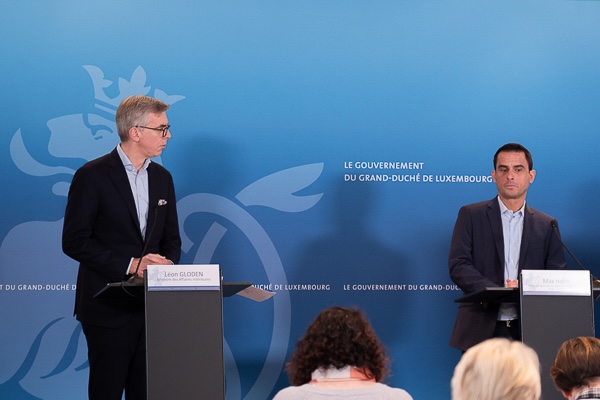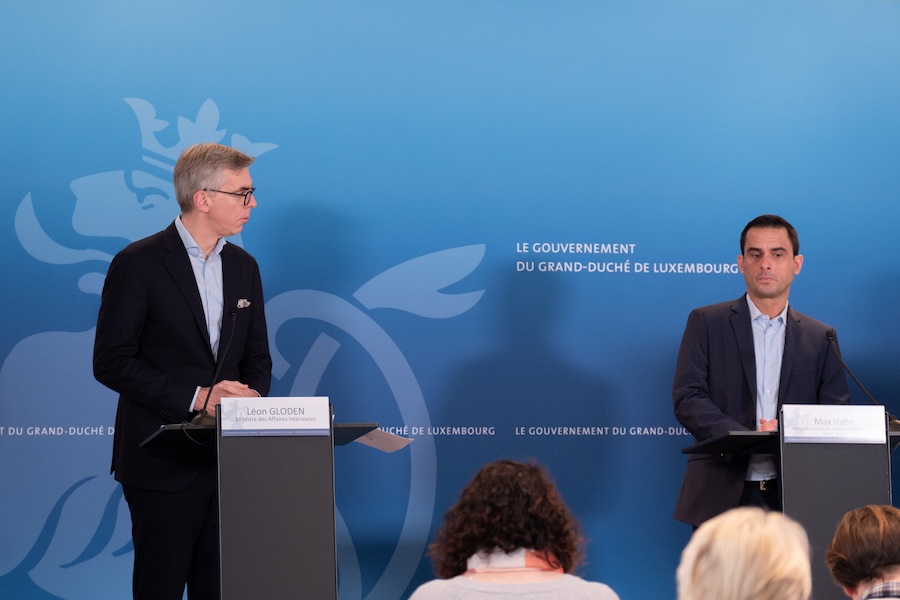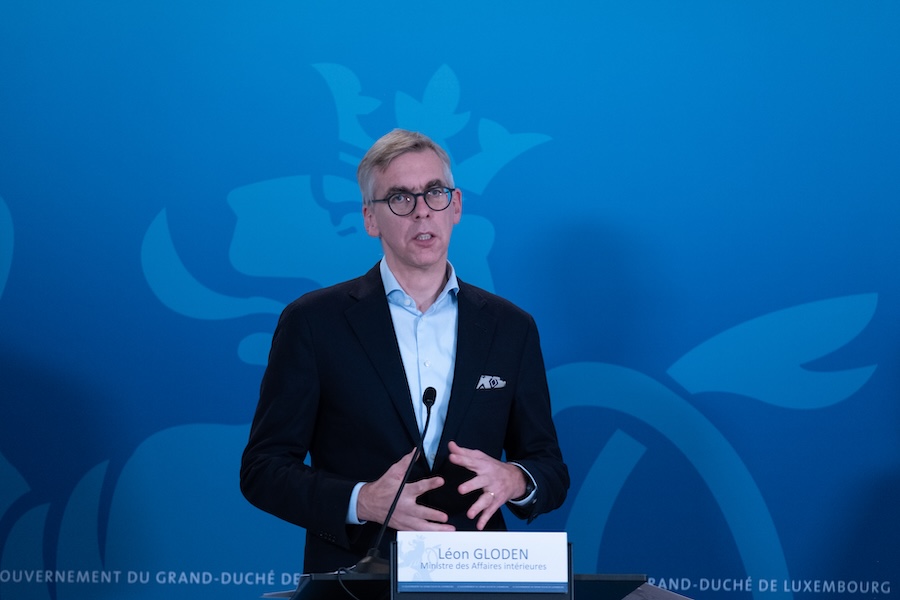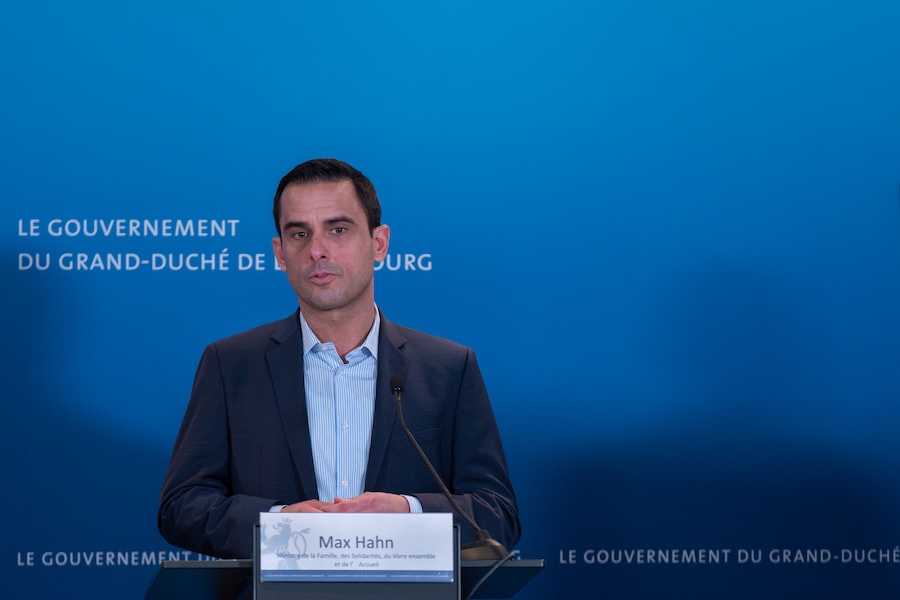 (L-R) Léon Gloden, Luxembourg's Minister for Home Affairs; Max Hahn, Luxembourg's Minister for Family Affairs, Solidarity, Living Together and Reception of Refugees;
Credit: Ali Sahib, Chronicle.lu
(L-R) Léon Gloden, Luxembourg's Minister for Home Affairs; Max Hahn, Luxembourg's Minister for Family Affairs, Solidarity, Living Together and Reception of Refugees;
Credit: Ali Sahib, Chronicle.lu
On Monday 3 January 2025, Luxembourg’s Minister for Home Affairs, Léon Gloden, and the Minister for Family Affairs, Solidarity, Living Together and Reception of Refugees, Max Hahn, presented the 2024 report on Asylum, Immigration and Reception to members of the press, at a conference held at Hôtel Saint-Augustin in Luxembourg-Ville.
The ministers outlined the latest developments in relation to immigration, asylum and integration of third country nationals in Luxembourg in 2024.
Minister Gloden presented a review of asylum and immigration statistics. He stated that Luxembourg ranks fifth in Europe regarding the number of international protection applicants it receives per capita. He confirmed an increase in the granting of international protection (refugee or subsidiary protection status) in the Grand Duchy in 2024. A total of 1,018 applications were granted (out of 2,018 applications), which represents an increase of 6% compared to 2023. 502 applications were refused, which represents an increase of 26% from 2023. He also confirmed that a total of 67% of applications were granted, a decrease from 71% in 2023. The highest number of applicants came from Eritrea (374) followed by Syria (307) and Algeria (135).
Minister Gloden clarified that the number of temporary occupation authorisations granted increased to 371, i.e. up 167% compared to 2023. These authorisations allow applicants to work while their international protection application is being processed. 438 temporary occupation authorisations were refused and those affected were required to leave Luxembourg. This represents an increase of 56% compared to 2023 and includes 308 who voluntarily left.
Speaking of the government’s asylum policy, Minister Gloden reiterated the need for solutions that work for all of society: "People with a real prospect of international protection must receive a response in the short term in order to be able to integrate quickly. Those who have no prospect of obtaining refugee status must be informed and returned to their country as soon as possible. We must avoid creating false hopes among these people."
The minister also confirmed the transfer of 240 applicants out of Luxembourg under the Dublin regulation, in which asylum seekers can only have their application for protection considered in the first EU country in which they arrive.
The minister continued by discussing the support, including financial and psychological, available to those awaiting return to their country of origin or to another EU member state. One of the aims of this support is to assist and encourage failed applicants to leave voluntarily. people leave In September 2024, dedicated accommodation for these failed applicants opened in Luxembourg-Kirchberg.
Minister Max Hahn spoke of the important role of the National Reception Office (ONA) in providing reception and support to international protection applicants and to beneficiaries of temporary protection. He reported that 8,200 bed places were available in 73 ONA reception centres throughout the country. He emphasised that Luxembourg has one of the highest ratios of beds per capita in the European Union. Five new reception centres opened in 2024, with a total capacity of 376 beds. These include four centres for international protection applicants: Schimpach (58 beds), Ettelbruck (149 beds), Diekirch (8 beds) and Hesperange (43 beds). In addition, the new centre in Esch-sur-Alzette, with 118 beds, offers accommodation to beneficiaries of temporary protection.
Minister Hahn confirmed that 2,790 people enrolled with ONA in 2024, whereas 2,148 left the ONA network. He underlined that the occupancy rate of ONA centres is currently 97%. He added that, in 2024, 87 different nationalities were represented at ONA centres, with Syrians, Ukrainians and Eritreans being the largest cohort. He noted that a third of ONA beds were occupied by beneficiaries of international protection, the majority of whom remain at the centre more than a year after obtaining their status. As a result, a working group has been established to review this situation.
Minister Hahn also spoke of the government’s continued efforts to increase bed capacity and accommodation for asylum seekers and refugees: "The MFSVA [Family Affairs Ministry] and the ONA are constantly looking for new land and buildings in order to set up new accommodation structures, even if only temporarily. I would like to thank the 34 municipalities that have a structure on their territory for their solidarity. The government's objective is to convince the municipalities that are still hesitant, to raise their awareness and to develop a joint project. The municipalities are essential partners in this area, whether it is the reception of asylum seekers or successful integration into local life. This is why it is essential to seek constructive collaboration with them”.











